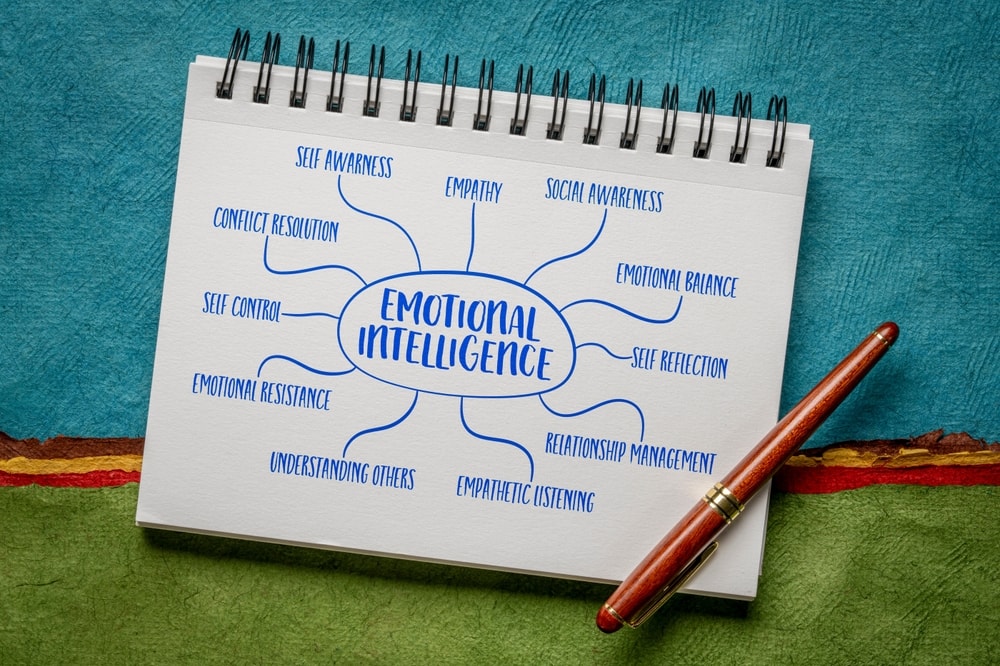Table of content
Conflicts show up everywhere. It can be between coworkers, in classrooms, at events, and even within ourselves. While conflict is often treated like a distraction, unresolved tension can erode trust, drain energy, and hold people back from collaborating or even just thinking clearly.
What makes the difference in how things unfold is not always the policies or procedures. The difference is how people respond in the moment. That is why emotional intelligence is so crucial. This set of skills helps people navigate conflict without making it worse.
This blog explores the link between emotional intelligence in conflict resolution and real-world de-escalation strategies.
What Is Emotional Intelligence and Why Does It Matter in Conflict Resolution?
Emotional intelligence refers to how well someone understands and manages their own feelings while also recognizing and responding to the emotions of others. Emotional intelligence is not just about staying calm but about knowing how to read a room, adapt your response, and guide a tense situation toward a healthier direction.
The idea was first formalized by Salovey and Mayer in the early 1990s. They described emotional intelligence as the ability to perceive, understand, use, and regulate emotions effectively.
That said, why does this matter so much when things get heated? Here are a few key reasons.
Self-Awareness Prevents Escalation
When people practice self-awareness, they are less likely to get caught off guard by their reactions. They can recognize when their tone shifts, when defensiveness creeps in, or when a personal bias is influencing how they are hearing the other person.
This space between reaction and response is where good decisions live. In conflict, that moment of pause can make the difference between cooling things down and saying something regrettable.
Understanding Your Own Emotions Builds Control
Being aware of what you are feeling and why is one thing. Knowing what to do with those feelings is another.
Someone with high emotional intelligence might notice frustration bubbling up but choose to redirect that energy into clarifying the issue rather than attacking the person. This kind of self-regulation does not mean shutting feelings off. It means using them constructively.
Empathy Supports Mutual Understanding
Many arguments spiral because people feel ignored or invalidated. Empathy, as part of social awareness, helps us slow down and see things from the other person’s perspective.
However, that does not mean agreeing. It means acknowledging, and when people feel seen, they are more likely to calm down and engage. This leads to mutual respect and often makes solutions easier to find.
Emotional Skills Shape Stronger Professional Relationships
In team settings, emotional skills help prevent misunderstandings and reduce the risk of passive-aggressive dynamics. People who manage their emotions well tend to build trust faster, which keeps communication open, even when workplace conflicts arise.
This contributes to professional relationships that are built to last, not break under pressure.
Emotional Regulation Reduces Stress in the Moment
Stress is normal during conflict situations. However, when someone learns how to manage emotions, the stress does not have to take over.
Techniques like deep breathing, pausing before speaking, or mentally reframing the situation all help de-escalate faster. Teams that normalize these skills tend to create a more stable, productive work environment.

Skills That Strengthen Emotional Intelligence
People are not born with perfect emotional intelligence (EI). It is a combination of habits, mindset, and learned behavior. While some may pick it up more naturally, the core skills behind it can be developed over time.
Below are some of the most critical skills that strengthen EI.
Self-Awareness
The ability to recognize internal shifts, such as anger rising, anxiety creeping in, and impatience sharpening your voice, comes from regular check-ins. People who practice self-awareness are constantly tuning into their body language, thoughts, and tone.
This does not mean overanalyzing every feeling but simply noticing the emotional temperature before it boils over.
Managing Your Own Emotions
It is easy to get caught in reactive loops, especially in challenging situations. People with high emotional intelligence can name what they are feeling: frustrated, embarrassed, or threatened.
They can assess whether that feeling is helping or hurting. That choice creates space for more effective communication and less emotional fallout.
Empathy and Social Awareness
Social skills are about being attuned to subtle cues. When someone folds their arms or avoids eye contact, they are saying something without words.
Recognizing these signals helps emotionally intelligent people adjust their tone, pace, or message. It is also the gateway to collaborative problem-solving and better team dynamics.
Self-Control
Self-control is not about bottling emotions but about having a handle on them. Leaders who can respond thoughtfully rather than impulsively are more likely to be trusted in a crisis.
That trust becomes contagious: when someone stays calm, others often follow suit. That is how stronger relationships are built, even in the heat of conflict.
Active Listening
Sometimes, what people need most is not a solution. They want to feel heard. Active listening means staying focused, asking clarifying questions, and responding to what was actually said, not just what you assumed.
In high-stakes conversations, this can mean everything. When parties involved in a conflict feel listened to, they are more likely to stay in the conversation rather than shutting down.
High-Conflict Situations Where These Skills Are Particularly Beneficial
Not all conflict situations look the same. Some are loud and obvious. Others simmer quietly until something small tips the balance.
The one thing they all share? The parties involved often react emotionally, sometimes without even realizing it.
Consequently, applying emotional intelligence should be about staying steady enough to guide the moment toward resolution. The scenarios below show where those skills really matter.
Angry Customers in Customer Service Roles
Frontline workers often deal with conflicts that arise from frustration over delays, misunderstandings, or unmet expectations. When emotions escalate, active listening can help shift the energy.
A calm tone, a validating statement, and a willingness to see the other person’s perspective, even briefly, can take the edge off and lead the conversation toward a solution.
Hostile Team Members in a Meeting
Internal meetings can get tense when competing interests surface, whether it is about deadlines, direction, or credit. If one person starts dominating or attacking, the mood shifts.
In such cases, self-awareness and emotional regulation can keep the conversation from spiraling. By managing tone and practicing mutual respect, teams can return to collaborative problem-solving instead of digging into sides.
Students Confronting Authority in the Classroom
Educators face unique challenges when students challenge boundaries or authority figures. Inasmuch as these moments are about rules, they are about emotional needs, too.
Teachers with high emotional intelligence use techniques like body language mirroring, pauses, and empathy to lower tension. That protects mental well-being and strengthens classroom trust over time.
Healthcare Staff Navigating Patient Stress
Nurses, doctors, and technicians frequently meet people at their most vulnerable. Add high-stress environments, and handling conflicts becomes part of the daily routine.
Studies show that head nurses with high EI are better at navigating tensions between staff and patients. Their ability to manage emotions, stay present, and deliver effective communication even under pressure can mean safer care and smoother outcomes.
Disagreements Between Colleagues in Remote Teams
Virtual work has made some workplace conflicts less visible but no less real. Misread messages, delayed responses, and lack of nonverbal cues can make small issues snowball.
Emotionally intelligent people pick up on tone shifts in emails or Zoom calls. They remain engaged instead of avoiding tough conversations, using empathy and social awareness to bridge the distance.
Community Disputes in Public or Shared Spaces
When neighbors or eventgoers clash, it is often about more than the surface issue. Maybe someone feels disrespected or unheard. Maybe there is a lack of trust.
In these cases, relationship management becomes essential. The goal is not just to resolve one conflict but to protect community bonds. Leaders who use active listening, empathy, and constructive coping strategies tend to see longer-lasting peace.
How We Incorporate Emotional Intelligence Into Our De-Escalation Training Modules
At Defuse, we build emotional intelligence into every part of our de-escalation training. Whether your team operates in retail, healthcare, education, or event management, we teach effective conflict management strategies to help you create a calmer, more collaborative environment.
We Customize Workshops for Real-World Pressure
We start by customizing each session. That means understanding the types of workplace conflicts you face and the people who experience them.
Our conflict specialists draw from real-world experience to create interactive workshops that reflect the specific stressors your team encounters daily.
We Develop Transferable Skills for Every Setting
One core piece of our approach is understanding emotional intelligence as a skillset that applies to both personal and professional life. We walk participants through actual tension scenarios and then teach them how to apply problem-solving skills and relationship management techniques in real time.
That includes learning to remain calm, read body language, and apply self-control when the stakes feel high.
We Go Beyond Communication Basics
We cover the psychology of escalation, how negative emotions can hijack thinking, and what it really means to effectively manage stress responses.
We also model how emotionally intelligent leaders influence culture from the top down, setting the tone for mutual understanding, stronger team relationships, and, ultimately, a more productive environment.
What makes our process different is the focus on numerous benefits beyond conflict itself. When people feel heard and respected, they do not just avoid tension-they build trust. They are more willing to step up, own their impact, and stay engaged even when things get tough.
The Impact of Training
When people learn how to respond rather than react, everything starts to shift. Whether it is on the job, in the classroom, or out in the community, emotional intelligence training creates lasting ripple effects.
Workplace Environments
In the workplace, unresolved tension creates friction. It slows down decisions, chips away at trust, and feeds into a toxic workplace culture. However, when teams understand how to effectively manage emotional responses in work-related conflict, they are more likely to collaborate instead of compete.
After training, leaders begin to set a calmer tone, which encourages everyone else to follow. Employees respond thoughtfully rather than reacting impulsively. Instead of avoiding tough conversations, they are more likely to engage with mutual respect.
This leads to stronger workplace relationships, better morale, and increased productivity, outcomes that benefit both the individual and the business as a whole.
Schools
Educators face constant emotional demands. From student outbursts to parent frustrations to internal staff disputes, the school environment often amplifies conflict. Training built around emotional intelligence helps staff recognize triggers, build self-control, and remain engaged during challenging situations.
One major shift we see is in how teachers listen actively. When they validate student emotions before jumping into correction mode, students feel safer, and that safety reduces disruptions.
Over time, this eases tension and builds a foundation of stronger relationships that make learning possible, even in difficult moments.
Community Groups
Whether it is neighborhood associations, nonprofit boards, or public forums, conflict situations in communities can quickly become personal. People bring their values, emotions, and expectations to the table, and when those clash, things can escalate fast.
Training community leaders to use collaborative problem-solving, active listening, and social awareness skills helps create a more inclusive and respectful dynamic. It also empowers them to be neutral third-party voices in moments of division.

Practical Examples of Conflict Scenarios and De-Escalation Techniques
To understand how emotional intelligence works in practice, it helps to walk through some examples. These real-world scenarios show how being emotionally tuned in can completely shift the tone of an interaction.
The Retail Team Meltdown
During a holiday rush, two employees start snapping at each other behind the counter. One accuses the other of being lazy. The other fires back with sarcasm. The tension is so obvious that customers begin to take notice.
The manager steps in to de-escalate. They use emotional intelligence techniques like acknowledging each employee’s stress, asking them to take a brief break, and guiding the conversation later using effective communication.
This response resolves the situation and models what emotionally intelligent people do when conflicts arise under pressure.
The Student Who Shuts Down
A high school student refuses to participate in group work, arms crossed and clearly disengaged. A teacher trained in active listening avoids calling them out in front of others. Instead, they wait for a quieter moment, then ask open-ended questions and show empathy for the student’s frustration.
The teacher does not fix everything on the spot, but the student feels heard. That moment of validation opens the door to mutual understanding and eventually helps the student re-engage with the group.
The Hostile Public Comment Session
At a town hall meeting, a resident begins yelling about a perceived injustice. Tension spreads quickly. A facilitator, trained in de-escalation training, does not respond defensively. Instead, they paraphrase the speaker’s concerns, invite slower-paced dialogue, and maintain a calm posture and body language.
This does not silence disagreement but redirects it into something constructive. By remaining calm and emotionally present, the facilitator creates a space where the parties involved can actually have a conversation instead of a shouting match.
The Burned-Out Nurse
A nurse snaps at a coworker after being asked for help at the end of a long shift.
A supervisor notices and checks in using social awareness. Rather than reprimanding, they create space to discuss the situation. They recognize the nurse’s own triggers and help reframe the stress using coping strategies.
That small moment of relationship management de-escalates the tension and sets the tone for long-term support.
Why Emotional Intelligence Changes Everything
Whether you are leading a team, managing a classroom, or supporting your community, the ability to manage emotions and navigate tension makes a measurable difference. Emotional intelligence is a critical skill that shapes how people handle pressure, build trust, and show up when it matters most.
At Defuse, we specialize in helping organizations tap into these exact skills. Our de-escalation training programs are built to meet real-world challenges with practical, personalized strategies. We do not just teach people how to avoid conflict-we help them lean in with confidence, clarity, and composure.
If you are interested in leveraging emotional intelligence to strengthen your team or environment, we are here to help. From mastering difficult conversations to building lasting team relationships, our services are designed to promote clarity, connection, and change.
Want to see how this translates to long-term success? Here’s our take on how emotional intelligence jobs are evolving to reward exactly these skills.Don’t wait for tensions to boil over. Contact us to schedule a free consultation or explore our full range of training programs.



